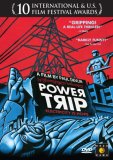| Reviews & Columns |
|
Reviews DVD TV on DVD Blu-ray 4K UHD International DVDs In Theaters Reviews by Studio Video Games Features Collector Series DVDs Easter Egg Database Interviews DVD Talk Radio Feature Articles Columns Anime Talk DVD Savant Horror DVDs The M.O.D. Squad Art House HD Talk Silent DVD
|
DVD Talk Forum |
|
|
| Resources |
|
DVD Price Search Customer Service #'s RCE Info Links |
|
Columns
|
|
|
Power Trip
One of the advantages of living in the Soviet Union was that you didn't have to pay for electricity. The state provided it. Free electricity and free beatings, that was the deal. When the Soviet republic of Georgia declared independence in 1991 (shortly before the Soviet Union fell), regulated, reliable electricity was one of the first casualties. Freedom meant living in the dark, at least for a while.
"Power Trip" tells the story of AES Corp., the American company that came into Georgia in 1999 to provide power to the people and faced myriad problems in doing it. The Georgians had been getting power however they could, tapping into wires, stealing from neighbors, etc., usually dangerously. AES set out to install meters, establish safe hookups, and -- this was the kicker -- charge people for the service.
When you're used to paying utility bills, paying for electricity sounds reasonable. But when it's always been free before, and when the average residential electrical bill is $24 -- compared to the average Georgian monthly salary of $15-$75 -- you're probably not going to like it. The Georgians didn't. When the film begins, only 10 percent of them were paying their bills. As a result, AES couldn't afford the materials necessary to produce enough power -- and much of the power they were producing was being diverted by the Minster of Energy to fatcats who NEVER paid their bills. Old ways die hard, even a decade after the regime has fallen.
Documentarian Paul Devlin follows the leaders of AES through a year of ups and downs in the Georgian capital of Tbilisi. Piers Lewis, AES' affable, self-deprecating project director, says he won't cut his hair until 50 percent of their customers are paying their bills. (It gets very long.) He recounts how AES shut off the power at the airport for non-payment, until an incoming flight terrified them into paying it after all.
AES seems to be doing all it can. It was founded by Dennis Bakke, a well-spoken man who came from a family of preachers and who acts like he came from a family of preachers, and who seems sincere when he talks about electricity as a fundamental need that AES is happy to supply. They just need people to PAY for it, that's all.
There are near-riots when non-paying customers are disconnected, and some comedy when angry residents smash the newly installed meters -- as if THAT'S going to help them get their power back. AES director Michael Scholey becomes a national celebrity, so frequently does he appear on Georgian television to discuss the crisis.
The entire film has a feeling of bemusement to it, as if filmmaker Devlin can scarcely believe it's happening. It all plays like a surreal comedy of errors. But it has a serious side, too. A Georgian journalist says, "Electricity is very much connected with hope.... People have lost hope."
THE DVD
The film is mostly in English, subtitled where necessary. There are no alternate language tracks or alternate subtitles.
The DVD comes with a thick booklet showcasing Docurama's many other documentary titles.
VIDEO: The movie's original aspect ratio -- 4:3, standard full-screen size -- is preserved. It was shot digitally to begin with and looks pristine on DVD.
AUDIO: As is often the case with documentaries, the sound quality varies depending on how improvised the shooting conditions were. These filmmakers had top-quality sound equipment, though, and the DVD mix (Dolby Digital Stereo) is more than adequate.
EXTRAS: There are six deleted scenes (8:55 total) that were probably cut only for time. They all add a bit of color and texture to the story and could well have been included in the film itself. (Well, except for the one called "Paraskiing Music Video," which is a couple minutes of paraskiing set to Georgian music. I don't know what the deal is with that.)
Also included is the complete satiric Georgian cartoon (11:08) of which a brief clip is shown in the film. It's subtitled for us, but I'm guessing a lot of the humor has been lost in translation. It's one of the more surreal and bizarre comedy pieces I've seen.
A few Georgian public service announcements (1:55 total) urging people to conserve electricity are included for added flavor. They're fun.
There are text bios for eight of the filmmakers, rather amateurishly written and poorly punctuated. (Commas are especially abused, both through overuse and underuse.)
Finally, the film's theatrical trailer is included.
IN SUMMARY
The movie itself is an interesting little specimen, serious enough to be socially worthwhile but light enough to be entertainment. It's not something you'd watch again and again, though, and the DVD treatment is adequate but not exceptional. A rental should be enough.
(Note: Most of the "movie review" portion of this article comes from the review I wrote when the movie was released theatrically. I have re-watched it in the course of reviewing the DVD, however.)
|
| Popular Reviews |
| Sponsored Links |
|
|
| Sponsored Links |
|
|
| Release List | Reviews | Shop | Newsletter | Forum | DVD Giveaways | Blu-Ray | Advertise |
|
Copyright 2024 DVDTalk.com All Rights Reserved. Legal Info, Privacy Policy, Terms of Use,
Manage Preferences,
Your Privacy Choices | |||||||















